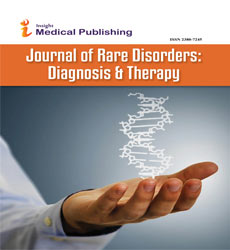Editorial on Diabetes Insipidus
Sophia Roberts*
DOI10.36648/2380-7245.21.7.28
Sophia Roberts*
Managing Editor, Journal Rare Disorders: Diagnosis & Therapy, United Kingdom
- *Corresponding Author:
- Sophia Roberts
Managing Editor
Journal Rare Disorders: Diagnosis & Therapy
United Kingdom
E-mail:raredisorders@emedicaljournals.org
Received Date:July 22, 2021; Accepted Date: July 29, 2021; Published Date: August 05, 2021
Citation: Roberts S(2021) Editorial on Diabetes Insipidus. J Rare Disord Diagn Ther Vol.7 No.7:28.
Editorial
Diabetes insipidus (DI) is a rare condition that ends up in frequent micturition (passing tons of clear urine) and excessive thirst. The condition could also be caused by issues together with your ductless gland and/or your kidneys. DI isn't associated with diabetes (type one and kind two diabetes), that is once your levels of blood glucose (glucose) area unit too high.
Symptoms
The main symptom of all cases of diabetes is to pass high volumes of diluted piss. The second commonest symptom is thirst, or excessive thirst. During this case, results from the loss of water are through piss. The thirst prompts the person with diabetes to drink giant volumes of water. The requirement to urinate will disturb sleep. The quantity of piss passed daily will be anyplace between three liters and twenty liters and up to thirty liters in cases of central diabetes.
Another secondary symptom is dehydration thanks to the loss of water, particularly in youngsters UN agency might not be able to communicate their thirst. Youngsters could become listless and feverish, expertise physiological reaction and diarrhoea, and should show delayed growth. People unable to assist themselves to water, like individuals with insanity, also are in danger of dehydration. Extreme dehydration will result in symptom, a condition during which the Na concentration of the blood serum within the blood becomes terribly high thanks to tide retention. The cells of the body conjointly lose water.
Causes
Diabetes insipidus area unit coupled to a endocrine referred to as antidiuretic hormone however occur in several ways in which. Vasopressin promotes water retention within the kidneys. This conjointly keeps pressure level at a healthy level. The most symptoms, excessive piss output, will produce other causes. These would typically be dominated out before creating a identification of diabetes. For instance, unknown or poorly managed diabetes will cause frequent micturition. Central diabetes is caused by reduced or absent levels of antidiuretic hormone.
The condition will be gift from birth, or primary. Secondary central diabetes is non inheritable later in life. The reason behind primary central diabetes is commonly unknown. Some causes result from associate abnormality within the factor accountable for antidiuretic hormone secretion. The secondary sort is noninheritable through diseases and injuries that have an effect on however antidiuretic hormone is created. These will embrace brain lesions ensuing from head injuries, cancers, or surgical procedure. Alternative body-wide conditions and infections may also trigger central diabetes.
Diagnosis
The water deprivation check involves permitting a patient to become more and more dehydrated whereas taking blood and piss samples. Antidiuretic hormone is additionally given to check the kidneys’ ability to conserve water throughout dehydration. In addition to managing the hazards of dehydration; shut supervising conjointly permits mental thirst to be definitively dominated out. This condition causes an individual to obsessively or routinely drink giant volumes of water. Somebody with mental thirst could attempt to drink some water throughout this check, despite strict directions against drinking. Samples taken throughout the water deprivation check area unit assessed to work out the concentration of piss and blood, and to live levels of electrolytes, notably Na, within the blood. Underneath traditional circumstances, dehydration triggers the secretion of antidiuretic hormone from the ductless gland within the brain, telling the kidneys to conserve water and concentrate the piss. In diabetes, either skimpy antidiuretic hormone is discharged, or the kidneys area unit immune to the endocrine. Testing these dysfunctions can facilitate outline and treat the kind of diabetes.
Treatment
Diabetes insipidus becomes a heavy downside just for those that cannot replace the fluid that's lost within the piss. Access to water and alternative fluids makes the condition manageable.
If there's a treatable underlying reason behind the high piss output, like diabetes or drug use, addressing this could facilitate resolve the diabetes. For central and pregnancy-related diabetes, drug treatment will correct the fluid imbalance by commutation antidiuretic hormone. For nephrogenic diabetes, the kidneys would require treatment. Vasopressin endocrine replacement uses an artificial analog of antidiuretic hormone referred to as desmopressin.
Open Access Journals
- Aquaculture & Veterinary Science
- Chemistry & Chemical Sciences
- Clinical Sciences
- Engineering
- General Science
- Genetics & Molecular Biology
- Health Care & Nursing
- Immunology & Microbiology
- Materials Science
- Mathematics & Physics
- Medical Sciences
- Neurology & Psychiatry
- Oncology & Cancer Science
- Pharmaceutical Sciences
